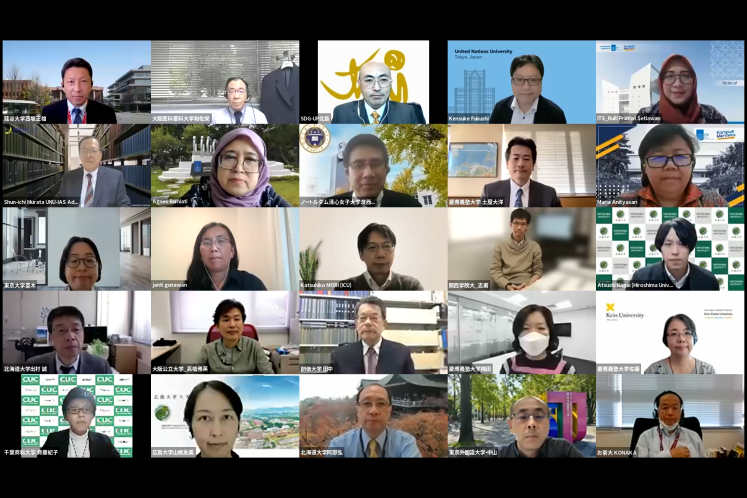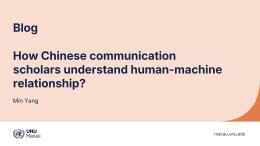On 10 November 2021, UNU-IAS hosted the 12th workshop of the SDG–Universities Platform (SDG-UP). The online event engaged 48 participants from 23 universities across Japan. Guest speakers Maria Anityasari and two other lecturers from the Institute of Technology Sepuluh Nopember (ITS) in Surabaya, Indonesia, discussed ITS initiatives for implementing the SDGs. The university, located in eastern Indonesia, was ranked 64th in the world in the 2021 Impact Rankings by Times Higher Education.
The speakers explained that ITS’s innovations were guided by the three dharmas (responsibilities) of Indonesian universities: education, research and development, and community service. Even before the adoption of the SDGs in 2015, ITS had been engaged in several sustainability-related activities. In 2020, the World Class University (WCU) division was established to focus on data collection and analysis, and to create and implement action plans to strengthen and improve SDGs activities.
Participants discussed an additional national goal for sustainable development introduced by the Ministry of Village, Development of Disadvantaged Areas and Transmigration, which addresses problems related to poverty, quality of education, and water and sewage systems. This goal, "Dynamic Village Development and Adaptive Village Culture", aims to further develop and expand villages by incorporating village traditions, wisdom, and institutions benefitting the Indonesian people who are diverse in terms of religion, culture, and language. In January 2020, the SDGs Center was established and launched Village SDGs, an initiative focused on SDG development in villages, with the support of governments, NGOs, businesses, and local communities. Dr. Anityasari invited Japanese universities to join ITS programmes such as the Sister Village Program and the Guest Lecture Series (GLS), and participate as partners and lecturers to promote activities contributing towards achieving the SDGs in Indonesia.
After a Q&A session, a group discussion focused on the theme of collaboration with universities overseas. Participants shared the view that promoting the SDGs was a very effective way to connect with universities abroad and talked about the challenges of implementing collaborative online classes.
Shunichi Murata (SDG-UP Advisor; Professor, School of Policy Studies, Kwansei Gakuin University) stated that by focusing on education, research and development, and community service, ITS incorporated SDG elements into policy, and acted as a mediator between national and local governments. Prof. Murata pointed out that the three guest speakers were change agents, and that their success in launching a special unit on the SDGs while implementing structural reforms may have also contributed to their improved standing in the Impact Ranking. He concluded the workshop by praising the efforts of ITS to achieve the SDGs by focusing on innovation despite inadequate resources, and encouraged Japanese universities to uphold the importance of innovation in their SDGs-related efforts.
A detailed report on the event is available in Japanese.
Participating Universities
23 universities participated in this workshop, listed below in alphabetical order:
Chiba University of Commerce
Hiroshima University
Hokkaido University
International Christian University
International University of Japan
Kanagawa University
Keio Gijuku University
Kwanseigakuin University
Kyushu Sangyo University
Kyushu University
Nara University of Education
Notre Dame Seishin University
Ochanomizu University
Okinawa Institute of Science and Technology
Osaka Medical and Pharmaceutical University
Osaka Metropolitan University
Ryukoku University
Soka University
Sophia University
Tokyo City University
Tokyo Institute of Technology
The University of Kitakyushu
University of Tokyo




